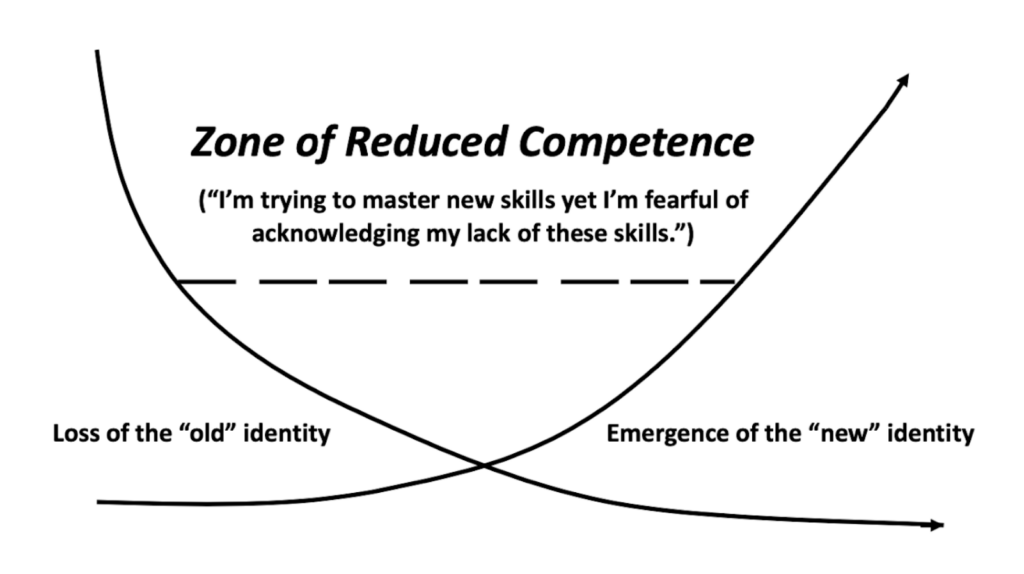You 2.0 Could Be on the Horizon
Today’s Tuesday Reading is from Justin Sipher, Program Leader, Leadership Coach and Consultant at MOR Associates. Justin may be reached at [email protected] or via LinkedIn.
If you don’t know where you are going, any road will get you there. – Lewis Carroll
We have all heard this phrase related to having a plan. Whether it’s in our personal or professional aspirations, it’s ideal to know where we are going. I’ve used it recently with my son who just graduated college, which I am sure I am not alone in. I used it on myself when deciding to launch a major career transition five years ago. Today I am NOT using it with respect to major life or career milestones, instead this quote came to mind when thinking about developing ourselves. Our growth, or deciding where and how to grow, can also be a road to a destination instead of aimlessly wandering. In fact, being intentional in our development SHOULD BE our expectation.
At a workshop late in 2022 we were challenging the cohort members to apply a “stretch and challenge” mindset to their growth in leadership abilities. We used the metaphor of YOU 2.0 as a way of suggesting that growth can be transformational, can be a game-changer on one’s journey. At that time my brain went back to my earlier technology days and thinking about software versions. In other words what differentiated a software going from version 1.0 to 1.0.1 vs 1.1 vs 2.0.
I like the software version number analogy as it so clearly sets expectations when an upgrade surfaces. In my recollection the variations are along the lines of:
- 1.0.1 is an upgrade largely around a bug fix, or a simple fix for something that was overlooked in development. Fixes are great, but not transformational in the use of the product. Also, rarely does a version upgrade this minimal represent new abilities or core functionality.
- 1.1 represents not only a fix, but perhaps a new feature that aligns with the core abilities of version 1.0. Not transformational, but a “nice to have” ability could surface in a version change like this. There is nothing wrong with 1.1 as it represents incremental change and resulting improvement, however is that really what we want for the long term?
- 2.0 is normally reserved for a major upgrade in function & user experience, as well as the minor tweaks that would come from version 1.0.1 and version 1.1. Version 2.0 is associated with hard work that has been invested over time and finally surfaces in a way that significantly elevates the expectation of the user. A major version number upgrade should set the expectation of game-changing abilities.
So software version #’s work for me, and can connect us with how we think about and track our own growth in abilities. If there is an aspect of your leadership which you want and need to improve to elevate your impact, then consider where you are at now as You 1.0. Now think about that Desired Future State. Don’t settle, have it really be a transformation. This is your 2.0 “version” you should set sight on.
Now that you know where you are going, you need to have the road that will get you there. The task at hand is charting the course. This includes determining the practices you need to adopt, and stick with, to form the habits that will be the basis of You 2.0. It’s also where coaching and peer accountability can be of great assistance. Even world-class athletes have trainers and coaches. Why? Because truly pushing yourself outside your comfort zone is not easy without the right motivation and accountability. In fact, getting beyond our comfort zone has layers to it. The first layer is often fearful. Not sure how it will go, often we immediately want to retreat back inside our comfort zone. If we can get through that initial discomfort, we start to learn new skills and approaches while gaining some confidence. The final layer is where we achieve growth. Growth is where we set new expectations of ourselves. I hope that growth in ability is where you are aspiring.
Here is what I suggest:
- Find the support you need and be vulnerable
- Determine the next steps to put into practice
- Create a framework of accountability so that these practices become habit
- Use reflection as a means of learning through this change
- Don’t settle for small progress, continue to push forward
Stretch and challenge yourself. Determine your Desired Future State. Put the work into getting there. Then once you reach “You 2.0” acknowledge your accomplishment, appreciate what the growth has done for you, then get back at it. You 3.0 is right around the corner.

Which requires the most intentionality and focus as you journey toward your Desired Future State?
Last week we asked about comfort with the space in-between the “old” and the “new.”
- 12% said very comfortable – I thrive in-between
- 32% said comfortable
- 24% said neutral
- 26% said uncomfortable
- 6% said Yuck! Get me away from the in-between
Compared to prior weeks’ surveys, this appears one of the topics we are collectively least comfortable with, the space in-between. Half of us are neutral or uncomfortable, 44% of us having some degree of comfort, and about one in sixteen of us feel it is just plain yucky. As distinguish last week, this is not about the situational change in our environment, it is about the psychological trainsition and self-redefinition. That is difficult yet critical work for each of us to learn and grow as leaders. This week’s reading builds on this idea, challenging us to not just think about a “minor bug fix” version of transition, but the major game-changing update. What does You 2.0 look like and what steps can you begin this week on the journey to get there?

- July 2025 (1)
- June 2025 (4)
- May 2025 (5)
- April 2025 (5)
- March 2025 (4)
- February 2025 (4)
- January 2025 (4)
- December 2024 (3)
- November 2024 (4)
- October 2024 (5)
- September 2024 (4)
- August 2024 (4)
- July 2024 (5)
- June 2024 (4)
- May 2024 (4)
- April 2024 (5)
- March 2024 (4)
- February 2024 (4)
- January 2024 (5)
- December 2023 (3)
- November 2023 (4)
- October 2023 (5)
- September 2023 (4)
- August 2023 (4)
- July 2023 (4)
- June 2023 (4)
- May 2023 (5)
- April 2023 (4)
- March 2023 (1)
- February 2023 (1)
- January 2023 (4)
- December 2022 (3)
- November 2022 (5)
- October 2022 (4)
- September 2022 (4)
- August 2022 (5)
- July 2022 (4)
- June 2022 (4)
- May 2022 (5)
- April 2022 (4)
- March 2022 (5)
- February 2022 (3)
- January 2022 (4)
- December 2021 (3)
- November 2021 (4)
- October 2021 (3)
- September 2021 (4)
- August 2021 (4)
- July 2021 (4)
- June 2021 (5)
- May 2021 (4)
- April 2021 (4)
- March 2021 (5)
- February 2021 (4)
- January 2021 (4)
- December 2020 (4)
- November 2020 (4)
- October 2020 (6)
- September 2020 (5)
- August 2020 (4)
- July 2020 (7)
- June 2020 (7)
- May 2020 (5)
- April 2020 (4)
- March 2020 (5)
- February 2020 (4)
- January 2020 (4)
- December 2019 (2)
- November 2019 (4)
- October 2019 (4)
- September 2019 (3)
- August 2019 (3)
- July 2019 (2)
- June 2019 (4)
- May 2019 (3)
- April 2019 (5)
- March 2019 (4)
- February 2019 (3)
- January 2019 (5)
- December 2018 (2)
- November 2018 (4)
- October 2018 (5)
- September 2018 (3)
- August 2018 (3)
- July 2018 (4)
- June 2018 (4)
- May 2018 (5)
- April 2018 (4)
- March 2018 (5)
- February 2018 (5)
- January 2018 (3)
- December 2017 (3)
- November 2017 (4)
- October 2017 (5)
- September 2017 (3)
- August 2017 (5)
- July 2017 (3)
- June 2017 (8)
- May 2017 (5)
- April 2017 (4)
- March 2017 (4)
- February 2017 (4)
- January 2017 (4)
- December 2016 (2)
- November 2016 (7)
- October 2016 (5)
- September 2016 (8)
- August 2016 (5)
- July 2016 (4)
- June 2016 (12)
- May 2016 (5)
- April 2016 (4)
- March 2016 (7)
- February 2016 (4)
- January 2016 (10)
- December 2015 (4)
- November 2015 (6)
- October 2015 (4)
- September 2015 (7)
- August 2015 (5)
- July 2015 (6)
- June 2015 (12)
- May 2015 (4)
- April 2015 (6)
- March 2015 (10)
- February 2015 (4)
- January 2015 (4)
- December 2014 (3)
- November 2014 (5)
- October 2014 (4)
- September 2014 (6)
- August 2014 (4)
- July 2014 (4)
- June 2014 (4)
- May 2014 (5)
- April 2014 (5)
- March 2014 (5)
- February 2014 (4)
- January 2014 (5)
- December 2013 (5)
- November 2013 (5)
- October 2013 (10)
- September 2013 (4)
- August 2013 (5)
- July 2013 (8)
- June 2013 (6)
- May 2013 (4)
- April 2013 (5)
- March 2013 (4)
- February 2013 (4)
- January 2013 (5)
- December 2012 (3)
- November 2012 (4)
- October 2012 (5)
- September 2012 (4)
- August 2012 (4)
- July 2012 (5)
- June 2012 (4)
- May 2012 (5)
- April 2012 (4)
- March 2012 (4)
- February 2012 (4)
- January 2012 (4)
- December 2011 (3)
- November 2011 (5)
- October 2011 (4)
- September 2011 (4)
- August 2011 (4)
- July 2011 (4)
- June 2011 (5)
- May 2011 (5)
- April 2011 (3)
- March 2011 (4)
- February 2011 (4)
- January 2011 (4)
- December 2010 (3)
- November 2010 (4)
- October 2010 (4)
- September 2010 (3)
- August 2010 (5)
- July 2010 (4)
- June 2010 (5)
- May 2010 (4)
- April 2010 (3)
- March 2010 (2)
- February 2010 (4)
- January 2010 (4)
- December 2009 (4)
- November 2009 (4)
- October 2009 (4)
- September 2009 (4)
- August 2009 (3)
- July 2009 (3)
- June 2009 (3)
- May 2009 (4)
- April 2009 (4)
- March 2009 (2)
- February 2009 (3)
- January 2009 (3)
- December 2008 (3)
- November 2008 (3)
- October 2008 (3)
- August 2008 (3)
- July 2008 (4)
- May 2008 (2)
- April 2008 (2)
- March 2008 (2)
- February 2008 (1)
- January 2008 (1)
- December 2007 (3)
- November 2007 (3)
- October 2007 (3)
- September 2007 (1)
- August 2007 (2)
- July 2007 (4)
- June 2007 (2)
- May 2007 (3)
- April 2007 (1)
- March 2007 (2)
- February 2007 (2)
- January 2007 (3)
- December 2006 (1)
- November 2006 (1)
- October 2006 (1)
- September 2006 (3)
- August 2006 (1)
- June 2006 (2)
- April 2006 (1)
- March 2006 (1)
- February 2006 (1)
- January 2006 (1)
- December 2005 (1)
- November 2005 (2)
- October 2005 (1)
- August 2005 (1)
- July 2005 (1)
- April 2005 (2)
- March 2005 (4)
- February 2005 (2)
- December 2004 (1)